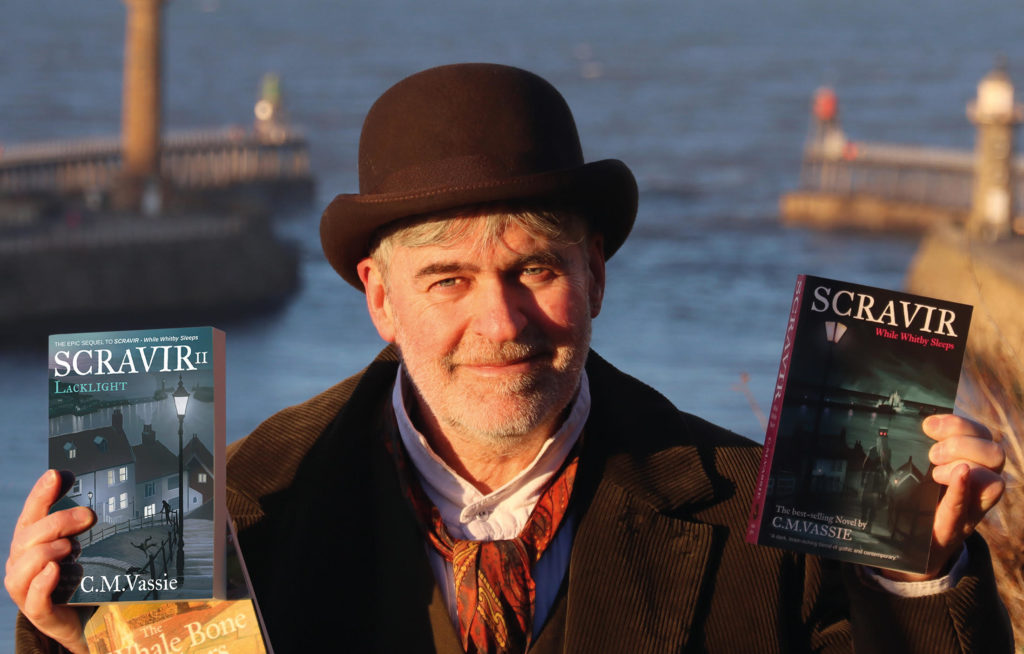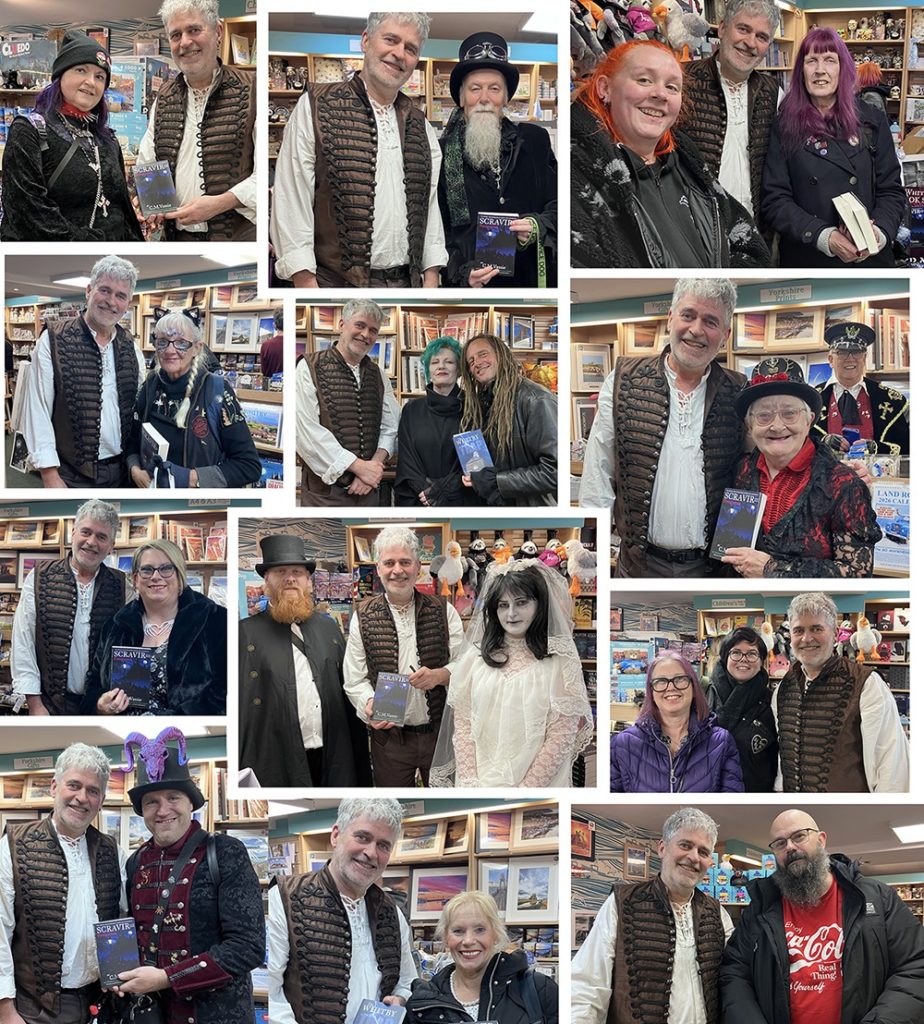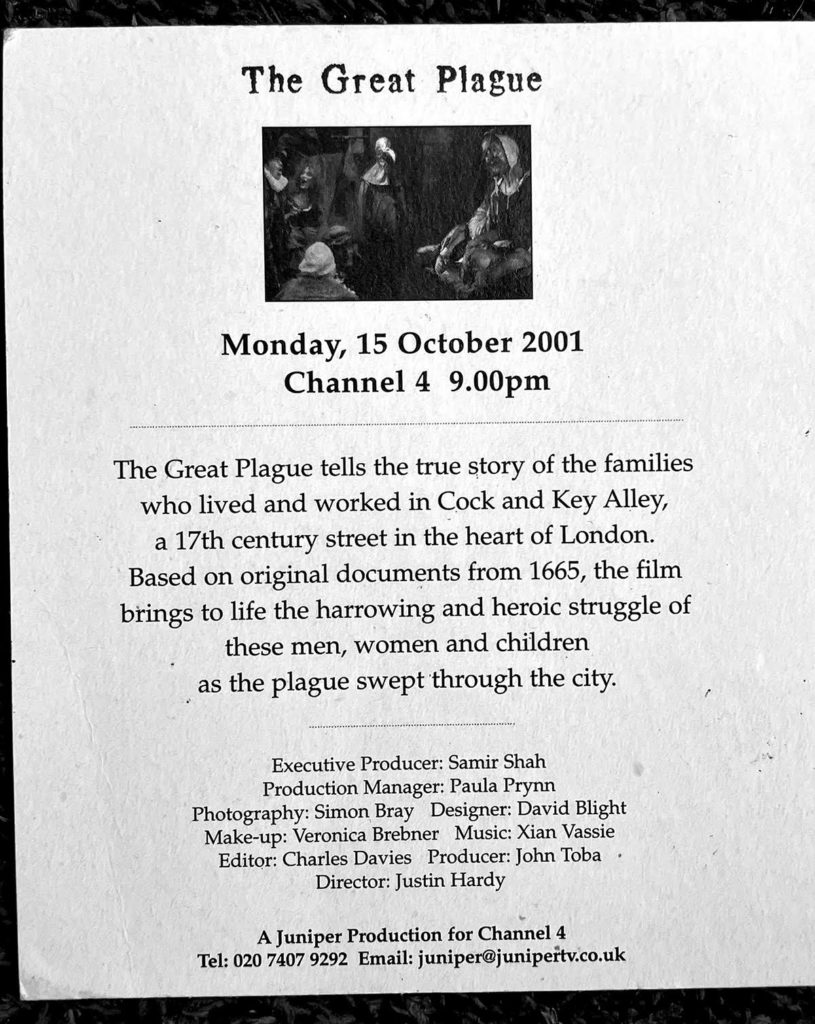
SCRAVIR author C.M. Vassie, pictured in Whitby, where his gothic horror trilogy is set. Costume courtesy of York Theatre Royal costume hire department
YORK author C.M. Vassie will hold a book signing and meet & greet session for the third instalment of his supernatural thriller trilogy, SCRAVIR III – Possession, at Holman’s bookshop, on Skinner Street, Whitby, on Saturday.
This 2pm to 4pm event forms part of the first Whitby Literature Festival Fringe and concludes Vassie’s promotional travels to the East Coast after book signings at the Whitby Shop and Whitby Bookshop over Whitby Goth Weekend.
Vassie is not only a gothic horror author but also the City of York councillor for Wheldrake with a long back story as film and TV music composer Xian Vassie for the BBC and others too from 1992 to 2012.
“While the SCRAVIR books are dark and nasty, they are nowhere as dark or as nasty as local politics,” says Liberal Democrats Councillor Christian Vassie/author C.M. Vassie.
SCRAVIR – a word made up by the author – is a contemporary gothic horror story that serves up a thriller and a police detective story too. Set in Whitby and Romania, its protagonists are a London youth, Daniel, and a Whitby lass, Tiffany, who works in a fish-and-chip shop. The nemesis is a Goth music star and the action takes place over Whitby Goth Weekend when emaciated bodies appear on streets in the old town.
The original book, SCRAVIR – While Whitby Sleeps appeared in the summer of 2021; the second, SCRAVIR II – Lacklight, followed in 2023. Now Vassie completes the trilogy for Injini Press with Possession, whose plot finds Thor Lupei dead and the pandemic shrinking in the rear mirror, as Daniel and Tiffany make a life together in Whitby, thinking they are safe.
Daniel’s past, however, looms over everything, and when a Goth Weekend gig at the Pavilion goes awry, they decide a holiday in Romania – to discover his mother’s Transylvanian origins – would be a grand idea.
“What could possibly go wrong?” teases the back cover taster. Go wrong? Not so for Christian Vassie, for whom everything has gone right since he ventured on his SCRAVIR journey (also writing the time-travelling adventure The Whitby Trap, set in the 1820s, en route).
Ahead of last weekend’s SCRAVIR III launch, he said: “The last book signing I did there had 65 costumed goths queuing for a chat and copies of the SCRAVIR books. Which is nice, though quite daunting as some of the fans know the stories better than I do!”
Whether composing music or writing books, Christian “finds things I want to do, and I don’t make a fortune but I’m able to make a living, like everyone else, and that’s fine,” he says. “When artists start off they have wild dreams of kidney-shaped swimming pools and five houses, but actually, if you can live a good life, that’s fine.
“I produced music for over 80 productions, but over those 20 years, downloading music has become so easy. You used to have to go to Denmark Street [in London]; now you have access to millions of pieces of music on your computer.

Author C.M. Vassie meets SCRAVIR book fans at launch events at Whitby Goth Weekend. “One even came as a deathly bride, one of the characters in the first book,” says Vassie
“I did the music for a series about the Medici in 2003 that you can find on YouTube and has had a million views, but I’ve never earned a penny from that. So you can either feel sorry for yourself or you adapt.”
Adapt he did, a decision brought on partly because he was going deaf. “I could trust my musicality, but I couldn’t trust my hearing,” says Christian. “I no longer had the confidence I needed – but I went out with a bang with Bishaash, a 12-part sci-fi series where Scooby Doo meets Star Trek meets Doctor Who, produced by BBC Worldwide and Bangladesh TV. That had 17 million views! What a wonderful way to go out. I could feel fulfilled.”
Christian had been the head chorister at York Minster in his Archbishop Holgate schooldays, going on to study African Languages and World Music at the School of Oriental and African Studies in London from 1979 to 1982. “I didn’t come from a musical family, but from the age of 11 or 12, I understood the meaning and value of excellence.”
That drive has never left him. “It has to be part of creativity,” he says. “When I worked on compositions for films, often the director would be satisfied before I was, and I would keep looking to improve. We’re driven to be artists because that is who we are – we just want to explore creative things.”
Hence the move into writing books, already armed with a grasp of how scenes are written how characters develop, from working on films. “It started off with writing a couple of thrillers that did nothing, printing 100 copies and selling 30,” he says.
“Then I wrote a children’s environmental book, a picture book, The Three Little Pigs And The Straw Stick House, when I was also instrumental in the eco-depot being built in James Street with straw bale cladding. That book sold in its thousands.”
Christian was off and running. “Careers in the arts are partly about learning a craft, but also about how you position yourself to make something that appeals to people, to find your audience, and these SCRAVIR books have been transformational for me,” he says.
“People ask me why I don’t set stories in York, but I went to Whitby as a child and loved it, and it’s been in my heart ever since, as it is for many York people. Whitby is so condensed and it’s on the edge of the unknown.
“That romanticism, being at the top of the cliff, looking out at what might be. Like Captain Cook, at a time when things were bl**dy hard, you could just pack your bags and leave. In reverse, it’s where Dracula arrives, so you can go out into the unknown or the unknown can come to you. That’s what makes Whitby so special; what makes it different from York. It’s like a door that’s permanently ajar.”
A door ajar for C.M. Vassie to explore his creativity in three SCRAVIR books. “It’s great to play a small part in shaping how our collective sense of place,” he says. “Yorkshire came close to losing Whitby old town altogether in the 1920s and 1930s as plans were advanced to bulldoze the entire area and replace the yards with modern housing.
“We are all lucky that didn’t happen. I like to imagine that the stories authors create in those ginnels and old buildings help to protect it from developers and give us a clearer view of our history. The armies of goths help too.”
Councillor Christian Vassie’s political thought for the day
“Councillors should be the conscience of the city.”

The Great Plague: Cutting provided by Christian Vassie
The Great Plague: Xian Vassie’s back story
CHRISTIAN Vassie composed the score for Chanel 4’s The Great Plague in 2001. “Samir Shah, now chairman of the BBC, told me it was the film of which he was most proud,” he says.
“It won the Best History award at the Royal Television Society awards in 2001 or 2002. It was a groundbreaking story because it told the story of the lives of a group of Londoners during the Great Plague, not from the recollections of Samuel Pepys or other lofty fellows but from the simple records of a churchwarden.
“He had recorded in absolute detail the tragedy that befell the inhabitants of an alley in London: who he had money to feed when they were locked in their homes to stop the spread of the disease; who he paid to bury their neighbours; how families were torn apart. Real peopl with real names.
“My contribution was to write a score that wasn’t period music to tell you how long ago the events took place; the music blended bluegrass and folk music. Drama documentaries at the period only had a silent cast, over which historians would be the human voices. My score gave the inhabitants of the alley back their voices, using songs without words to draw us into their world.”
Christian used a similar approach for their next joint film project, 2003’s Invitation To A Hanging, winner of the RTS Best History award the following year.
“That told the story of Jack Shepherd, a young man who arguably became the first working- class hero in England because his brief life, and escapes for Newgate Prison, coincided with the birth of newspapers,” he says.
“The score for that film, set in the 1720s, was a mixture of jazz, reggae, and soundscapes. Again the point was to avoid using music to tell the audience when the story was set, but rather to communicate that they were watching the original ‘Jack the Lad’, the hero of The Beggar’s Opera, the inspiration for the song Mack The Knife.
“Jack didn’t see himself as a historical figure but as a man about town, a celebrity. Until he was caught a fifth time and hanged…”
